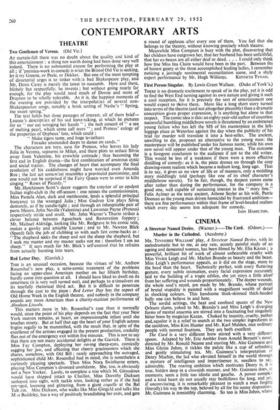Tins is an unusual occasion, because the virtues of Mr.
Andrew Rosenthal's new play, a serio-comic treatment of the problems facing an upper-class American mother on her fiftieth birthday, hardly come into question at all. I should have liked to dwell on its smartness (it is very well turned out), and perhaps to animadvert on its tearfully rhetorical third act. But it is difficult to penetrate through the cast to the piece : Red Letter Day has the aspect of Old Home Week in the English theatre, and nobody in the company sounds any more American than a charity-matinee performance of Abraham Lincoln.
This matters more in Mr. Rosenthal's case than it normally would, since the point of his play depends on the fact that your New York matron remains, at heart, an impressionable infant until she touches ninety. But at half that age the heart of your English actress br.gins regally to be mummified, with the result that, in spite of the excellence of the artistes engaged in the present production, credulity flies out of the emergency exit within five minutes. This is not to say that there are not many accidental delights at the Garrick. There is Miss Fay Compton, deploying her roving sheep-eyes, comically sagging her jaw, and affecting that cheery graciousness which she shares, somehow, with Old Bill ; rarely approaching the outraged, sophisticated child Mr. Rosenthal had in mind, she is nonetheless a curiously pleasing spectacle. Then Miss Nora Swinburne enters, playing Miss Compton's divorced confidante. She, too, is obviously not a New Yorker. Lastly, to complete a trio which M. Giraudoux would have shipped intact to Chaillot, Miss Dorothy Dickson sashayed into sight, with tackle trim, looking rather as if she had, em-rged, looming and glittering, from a giant coquille at the Bal Tab .rin. Miss Dickson, who walks like Miss Gingcld and talks like M ss Baddeley, has a way of positively brandishing her exits, and gets a round of applause -after every one of them. You feel that she belongs to the theatre, without knowing precisely which theatre.
Meanwhile Miss Compton is busy with the plot, discovering that her children have outgrown her, that her husband has been unfaithful, that her ex-beaux are all either deaf or dead. . . . I could only think how fine Miss Ina Claire would have been in-the part. Between fits of honest gaiety at the three accomplished leading ladies, I remember noticing a jarringly sentimental reconciliation scene, and a shyly expert performance by Mr. Hugh Williams. KENNEru TYNAN.


































 Previous page
Previous page